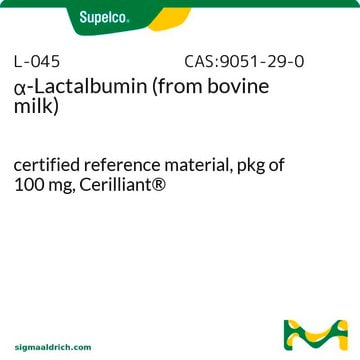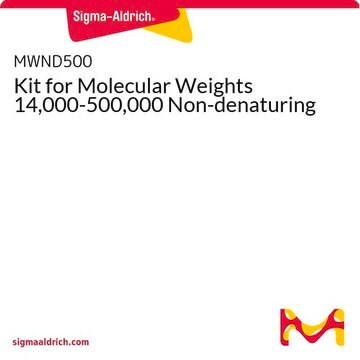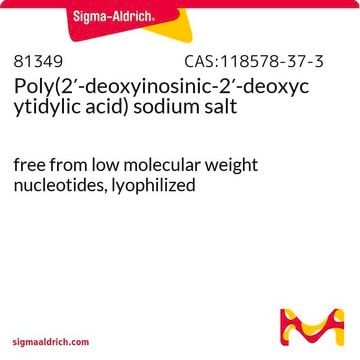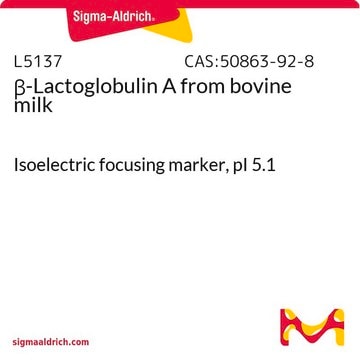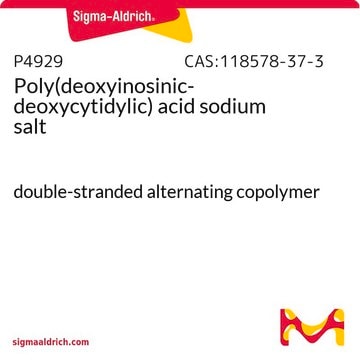L4385
α-Lactalbumin from bovine milk
Marker for non-denaturing PAGE
Iniciar sesiónpara Ver la Fijación de precios por contrato y de la organización
About This Item
Productos recomendados
biological source
bovine milk
Quality Level
form
lyophilized powder
mol wt
~14.2 kDa
technique(s)
microbiological culture: suitable
UniProt accession no.
storage temp.
−20°C
Gene Information
cow ... LALBA(281894)
¿Está buscando productos similares? Visita Guía de comparación de productos
General description
α-Lactalbumin is a small, globular, whey protein that has been found in all milk studied to date. It is a metalloprotein of approximately 14 kDa produced in the mammary glands.
Application
α-Lactalbumin was used in the isolation and analysis of restriction endonuclease digestive patterns of chromosomal DNA from Mycobacterium paratuberculosis and other Mycobacterium species. It was also used in a study to test if the neuroendocrine protein 7B2 suppresses the aggregation of neurodegenerative disease-related proteins.
Biochem/physiol Actions
α-Lactalbumin is the cheif protein in human milk. It consists of a single polypeptide chain with 8 cysteines which form disulfide bridges. α-Lactalbumin binds several metal ions, including calcium, which is thought to play a role in the regeneration of native α-lactalbumin from the reduced, denatured form. α-Lactalbumin also has a distinct zinc binding site that is thought to play a role in the binding of the lactose synthase complex. The mature protein consists of 123 amino acid residues (14 kD), and it has a three-dimensional structure with 1.7 Α° resolution, demonstrating four α-helices and a triple stranded antiparallel β-sheet.
Alters the substrate specificity of galactosyltransferase to increase the rate of lactose formation; the complex of galactosyltransferase and α-lactalbumin is called lactose synthase. Site-directed mutagenesis of Asp87 or Asp88 to Ala completely abolishes the strong calcium binding affinity and reduces the stimulation of lactose synthase to <3.5% of the maximal rate.
Reconstitution
0.9-1.4 mg/mL after reconstitution with 1 mL of water
Storage Class
11 - Combustible Solids
wgk_germany
WGK 3
flash_point_f
Not applicable
flash_point_c
Not applicable
Certificados de análisis (COA)
Busque Certificados de análisis (COA) introduciendo el número de lote del producto. Los números de lote se encuentran en la etiqueta del producto después de las palabras «Lot» o «Batch»
¿Ya tiene este producto?
Encuentre la documentación para los productos que ha comprado recientemente en la Biblioteca de documentos.
Los clientes también vieron
Why people become psychiatric nurses.
P Jackson
Nursing, 4(10), 32-34 (1990-05-10)
J Ren et al.
The Journal of biological chemistry, 268(26), 19292-19298 (1993-09-15)
It has been proposed that the binding of Zn2+ to alpha-lactalbumin switches the conformation to one akin to a state intermediate in the folding of the protein. However, the high resolution x-ray crystal structure of human alpha-lactalbumin-Zn2+ complex at 1.7-A
D B Veprintsev et al.
FEBS letters, 412(3), 625-628 (1997-08-04)
The thermal denaturation of bovine and human apo-alpha-lactalbumins at neutral pH has been studied by intrinsic protein fluorescence, circular dichroism (CD), and differential scanning microcalorimetry (DSC) methods. Apo-alpha-lactalbumin possesses a thermal transition with a midpoint about 25-30 degrees C under
D L Whipple et al.
Journal of clinical microbiology, 25(8), 1511-1515 (1987-08-01)
A relatively rapid and efficient method for the extraction of chromosomal DNA from Mycobacterium paratuberculosis and other mycobacteria was developed. Approximately 25 to 50 micrograms of DNA could be extracted from 100 mg (wet weight) of cells, which was sufficient
Michael Helwig et al.
The Journal of biological chemistry, 288(2), 1114-1124 (2012-11-23)
Neurodegenerative diseases such as Alzheimer (AD) and Parkinson (PD) are characterized by abnormal aggregation of misfolded β-sheet-rich proteins, including amyloid-β (Aβ)-derived peptides and tau in AD and α-synuclein in PD. Correct folding and assembly of these proteins are controlled by
Nuestro equipo de científicos tiene experiencia en todas las áreas de investigación: Ciencias de la vida, Ciencia de los materiales, Síntesis química, Cromatografía, Analítica y muchas otras.
Póngase en contacto con el Servicio técnico




